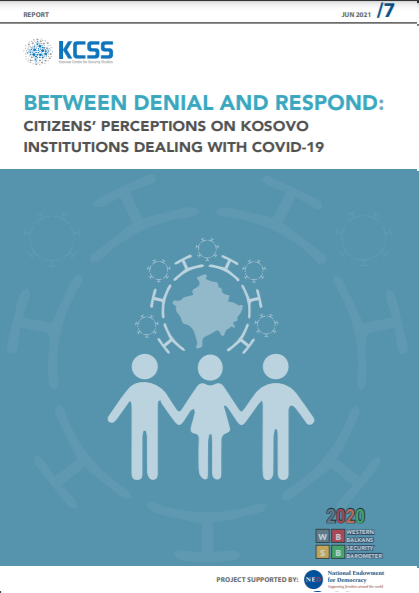30/06/2021

Kosovar Centre for Security Studies (KCSS)
National Endowment for Democracy (NED)
Plator Avdiu
First section of the report presents perceptions whether Kosovar respondents believe on the existence of the COVID-19 pandemic. It also interprets perceptions on how the Kosovo institutions handled the COVID-19 situation in Kosovo from March – September 2020. The second section is related to the degree the COVID-19 has impacted everyday life of citizens from socio-economic to human rights points of view. Whilst, the third section of the report highlights perceptions on political influence of foreign countries/organisations towards Kosovo on handling the COVID-19 as well as their financial and humanitarian aid donated to Kosovo amidst the coronavirus crisis in Kosovo.
A considerable number of citizens in Kosovo were doubtful and distrustful on the existence of coronavirus disease. This was specifically in common in the course of early stages of the pandemic situation, whilst some public figures were campaigning against the Kosovo Government’s prevention and protective measures against the spread of coronavirus disease in 2020. This apparently was motivated by circulation of dozens of conspiracies and pseudoscience news articles among the Kosovar media stating that the COVID-19 pandemic is an inexistent disease. Thus, citizens were eager to believe in conspiracy and disinformation campaign. This explains as to why 1/3 of citizens interviewed by Kosovar Centre for Security Studies (KCSS) through this survey back in September-October 2020 responded that they do not believe on existence of the COVID-19 pandemic.
Furthermore, KCSS decided to measure perceptions of Kosovar respondents on this specific matter as well as on the performance of Kosovo’s central, local, security and health related institutions on handling the COVID-19 pandemic crisis in the country in order to surface respondents’ perceptions on these issues. Besides this, this survey had also measured socio-economic impact of the COVID-19 pandemic in Kosovo and perceived foreign support / influence in Kosovo amid the COVID-19 pandemic. It is worth mentioning that perceptions presented in this report were gathered by Kosovo Security Barometer (KSB), a distinctive tool through which KCSS annually measures public perceptions in Kosovo on the trust towards institutions and various securityrelated issues, including attitudes on the COVID-19 pandemic situation in Kosovo. In its tenth edition, KSB has taken a regional dimension and marks the first edition of the Western Balkans Security Barometer (WBSB) implemented simultaneously in Kosovo and Serbia in September-October 2020.